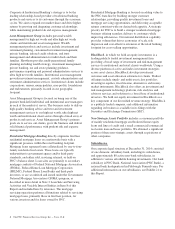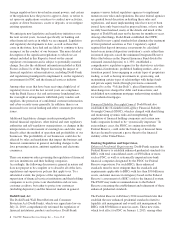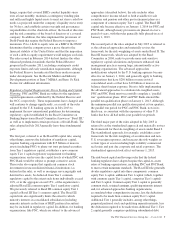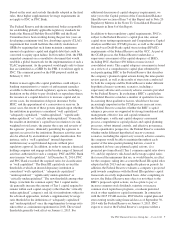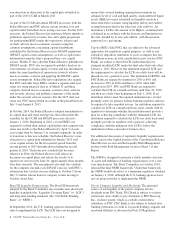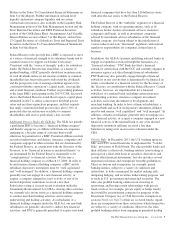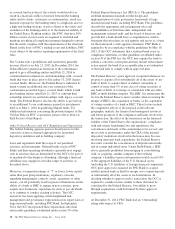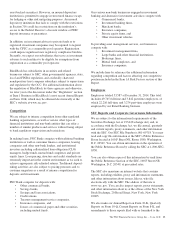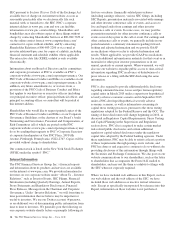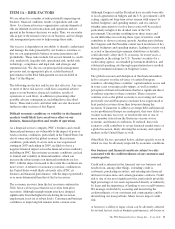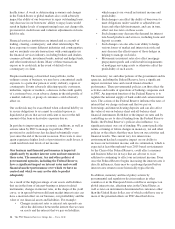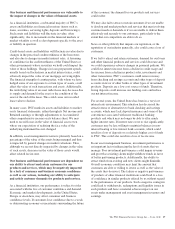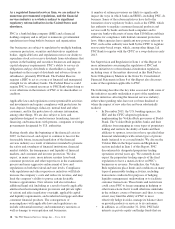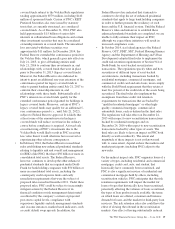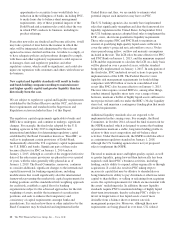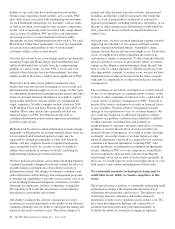PNC Bank 2014 Annual Report Download - page 30
Download and view the complete annual report
Please find page 30 of the 2014 PNC Bank annual report below. You can navigate through the pages in the report by either clicking on the pages listed below, or by using the keyword search tool below to find specific information within the annual report.exercise of its rulemaking authority, the CFPB is continuing
its ongoing examination and supervisory activities with
respect to a number of consumer businesses and products.
Securities and Derivatives Regulation
Our registered broker-dealer and investment adviser
subsidiaries are subject to rules and regulations promulgated
by the SEC.
Several of our subsidiaries are registered with the SEC as
investment advisers and may provide investment advisory
services to clients, other PNC affiliates or related entities,
including registered investment companies. Certain of these
advisers are registered as investment advisers to private equity
funds under rules adopted under Dodd-Frank.
Broker-dealer subsidiaries are subject to the requirements of
the Securities Exchange Act of 1934 and related regulations.
The Financial Industry Regulatory Authority (FINRA) is the
primary self-regulatory organization (SRO) for our registered
broker-dealer subsidiaries. Investment adviser subsidiaries are
subject to the requirements of the Investment Advisers Act of
1940 and related regulations. An investment adviser to a
registered investment company is also subject to the
requirements of the Investment Company Act of 1940 and
related regulations. Our broker-dealer and investment adviser
subsidiaries also are subject to additional regulation by states
or local jurisdictions.
Over the past several years, the SEC and other regulatory
agencies have increased their focus on the asset management,
mutual fund and broker-dealer industries. Congress and the
SEC have adopted regulatory reforms and are considering
additional reforms that have increased, and are likely to
continue to increase, the extent of regulation of the mutual
fund and broker-dealer industries and impose additional
compliance obligations and costs on our subsidiaries involved
with those industries. Under provisions of the federal
securities laws applicable to broker-dealers, investment
advisers and registered investment companies and their
service providers, a determination by a court or regulatory
agency that certain violations have occurred at a company or
its affiliates can result in fines, restitution, a limitation on
permitted activities, disqualification to continue to conduct
certain activities and an inability to rely on certain favorable
exemptions. Certain types of infractions and violations can
also affect a public company in its timing and ability to
expeditiously issue new securities into the capital markets. In
addition, certain changes in the activities of a broker-dealer
require approval from FINRA, and FINRA takes into account
a variety of considerations in acting upon applications for such
approval, including internal controls, capital levels,
management experience and quality, prior enforcement and
disciplinary history and supervisory concerns.
Title VII of Dodd-Frank imposes new comprehensive and
significant regulations on the activities of financial institutions
that are active in the U.S. over-the-counter derivatives and
foreign exchange markets. Title VII was enacted to (i) address
systemic risk issues, (ii) bring greater transparency to the
derivatives markets, (iii) provide enhanced disclosures and
protection to customers, and (iv) promote market integrity.
Among other things, Title VII: (i) requires the registration of
both “swap dealers” and “major swap participants” with one
or both of the CFTC (in the case of non security-based swaps)
and the SEC (in the case of security-based swaps);
(ii) requires that most standardized swaps be centrally cleared
through a regulated clearing house and traded on a centralized
exchange or swap execution facility; (iii) subjects swap
dealers and major swap participants to capital and margin
requirements in excess of historical practice; (iv) subjects
swap dealers and major swap participants to comprehensive
new recordkeeping and real-time public reporting
requirements; (v) subjects swap dealers and major swap
participants to new business conduct requirements, including
the provision of daily marks to counterparties and disclosing
to counterparties (pre-execution) the material risks, material
incentives, and any conflicts of interest associated with their
swap; and (vi) imposes special duties on swap dealers and
major swap participants when transacting a swap with a
“special entity” (e.g., governmental agency (federal, state or
local) or political subdivision thereof, pension plan or
endowment).
Based on the definition of a “swap dealer” under Title VII,
PNC Bank registered with the CFTC as a swap dealer on
January 31, 2013. As a result, PNC Bank is subject to the
regulations and requirements imposed on registered swap
dealers, and the CFTC will have a meaningful supervisory role
with respect to PNC Bank’s derivatives and foreign exchange
businesses. Because of the limited volume of our security-
based swap activities, PNC Bank has not registered with the
SEC as a security-based swap dealer. The regulations and
requirements applicable to swap dealers will collectively
impose implementation and ongoing compliance burdens on
PNC Bank and will introduce additional legal risks (including
as a result of newly applicable antifraud and anti-manipulation
provisions and private rights of action).
As originally enacted, the so-called “swap push-out”
provisions of Section 716 of Dodd-Frank required an insured
depository institution that is a “swaps entity” (defined to
include a registered swap dealer like PNC Bank) to cease
engaging in certain types of swaps by July 16, 2013, although
the institution’s appropriate Federal banking agency could
extend this transition period. In 2013, PNC Bank received
such an extension of the transition period to July 16, 2015
from its appropriate Federal banking agency. In December
2014, the U.S. Congress significantly narrowed the “push-out”
restrictions of Section 716. These amendments generally
allow insured depository institutions that are a swaps entity to
engage in all types of swaps other than structured finance
swaps (defined as a swap that references either an asset-
backed security or a group or index primarily comprised of
12 The PNC Financial Services Group, Inc. – Form 10-K


